Please Don't Get Stuck On Whether "Cis" Is a Slur or Not.
Defend Freedom of Belief and Speech Consistently

Reader, I lied. I am indeed going to address how the word ‘cis’ arose and arguments for and against considering it a slur. I am also going to argue that whether or not a term is a slur is irrelevant to whether or not defenders of free speech should support censoring it. They should not.
There is no doubt that X is censoring the word ‘cis’ although its algorithms do not always pick it up.
What is a Slur, and is “Cis” one?
There is no objective measure of what constitutes a slur and what does not because languages are social constructs that evolve and pick up connotations as they go. I was once asked sincerely by an autistic American why “Paki” is considered a slur while “Brit” is not even though they are both abbreviations of a nationality. It is because the former has been used as a derogatory term for anybody who appears to be of South Asian descent particularly in relation to incidents of racist violence known as ‘paki-bashing’ while “Brit” has been used as a neutral descriptor of a British person.
In my childhood, I was taught not to use the word “Jew” and instead to say “Jewish person” even though this means the same thing. This was because the word “Jew” was also commonly being used mostly a verb but sometimes as an adjective for somebody who conducted business unscrupulously. “Don’t let the second-hand car-dealer Jew you” meant “Don’t let them cheat you.” When challenged on this, the speaker would typically say they were not referring to literal Jewish people against whom they had no prejudice. (The drive for political correctness in the 90s did have some merits). This usage of the word “Jew” had gone from mainstream discourse by the time I was 30 and Jew again meant a person who was Jewish and was only used disparagingly by conscious antisemites.
There is a near social consensus that some words are slurs. The ‘n-word’ is widely considered the most unambiguous slur because it has been used to demean a set of people while treating them as subhuman and denying them rights or even ownership of themselves. “Faggot” is also fairly uncontested as a slur because the symbol of a faggot signifies a social pariah who needs to be burnt to remove their contaminating presence. It is unambiguously a disparagement of gay men whose consensual sex lives were illegal within living memory and who also commonly faced violent assault on the grounds of their sexuality.
It is a positive sign when such a consensus forms organically and people overwhelmingly reject the use of a word because of its baggage, and hold others who use it to convey that they hold those beliefs in low esteem. This is because battles over words are always ultimately battles over ideas. The shock and anger commonly felt at hearing someone use the n-word as a slur is at root an abhorrence of a mentality that holds black people to be subhuman chattel and the contempt and disgust often felt at the use of the word ‘faggot’ is ultimately a contempt for the idea that same sex attraction makes a man (in this case) something dirty and contaminating. The ideas that black people are fully human and of equal value and dignity to white people and that it is OK to be gay have overwhelmingly won out in the Marketplace of Ideas (although we can never get too complacent about that and racism and homophobia continue to exist)
When an argument is ongoing about whether a word is a slur or not, it can mean that people disagree about what ideas are being conveyed by it, but often it indicates that there is disagreement about whether those ideas are bad or not. As we see in Musk’s combination of ‘propaganda’ and ‘slur’, whether or not you consider the word ‘cis’ to be a slur largely depends on whether you think the ideas underlying it are bad or not. The ideas underlying the word ‘cis’ is a belief in an innate ‘gender identity’ which defines whether somebody is a man, a woman or neither more authoritatively than their biological sex does. In this worldview, if someone’s gender identity matches their biological sex, they are cis and if it does not, they are trans.
There is not yet a consensus on acceptance of this and the battle rages most strongly between trans activists who hold that this is absolutely true and gender critical activists who hold that is absolutely false. Surveys in the UK on what everybody thinks also reflect a profound lack of consensus, although the last big one is two years old and attitudes may well have changed since then. The trend has been towards more negative views. It found that only 8% of people paid a great deal of attention to it while 2/3rds of people have paid little to none. Nevertheless, about half of Britons thought prejudice against trans people was a serious problem which is comparable to the number who thought racial prejudice was, a majority supported social transition while support for legal transition was split. About a third of Britons thought trans rights posed a threat to women’s rights, about a third thought they did not and a third were unsure. I cannot find any data on what Britons think of the word ‘cis’ but it seems likely that the 2/3rds of Brits who are not paying much or any attention to trans issues will not know what it means.
This will be a battle of ideas between a relatively small proportion of the population. This will includes pro-trans activists made up of queer theory ‘woke’ activists, trans-identified people with various political views who nevertheless believe that gender identity is real and authoritative. On the other side will be anti-trans activists made up mostly of gender critical feminists who wish to abolish the notion of gender as an oppressive social construct and social and religious conservatives who support the notion of gender and gender roles but want them tied firmly to biological sex. And there will be freedom-orientated liberals (like me) who oppose aspects of trans activism that cause harm to or endanger women and children and denies freedom of belief and speech while otherwise letting people believe, speak and live as they see fit.
These three groups will respond to the question of whether “cis” is a slur like this:
Pro-trans: No, it just means ‘not trans’ and is a neutral descriptor that we need to talk about gender identity.
Anti-trans: Yes, it ascribes a gender identity to everybody without their consent and is also used aggressively to demean us.
Liberals: Maybe, but it’s just a word. You’ll survive. Let people use the language that describe their own positions and then argue with them if you want to.
Let me steelman those first two cases before arguing for the third one.
The case for Cis not being a slur
The word 'cis' did not arise to insult or disparage anybody. It arose in the same way as the word 'heterosexual'.
(Some of you are committed analogy-misunderstanders so I'll pause to remind you that analogies work by comparing things that are NOT the same but have some point of comparison. In this case, the point of comparison is how a word came into existence. Is it not a claim that sexuality and gender identity are the same kind of thing)
For a long time, there was no concept of homosexuality. Some people were perverts & that was one way of being a pervert. When this started to be regarded as wrong, the words “homosexual” & then “gay/lesbian/bi” as a neutral signifier for same sex attraction came into being. Once there were words for 'same-sex attracted' the words heterosexual or straight for 'opposite-sex attracted' emerged for ease of communication so as not to have to say 'non-homosexual' 'non-gay' or ‘non-lesbian,’ ‘non-bisexual’ where sexuality is relevant..
Sometimes, the way in which the word “gay” or “straight” is used has negative connotations.
“This party is so gay” (This party is dull, unexciting and generally not a success)
“Says the straight, white guy” (People with characteristics including heterosexuality necessarily lack understanding of power dynamics affecting minority groups and should shut up on the subject)
Nevertheless, the fact that some people associate homosexuality or heterosexuality with negative qualities does not make mention of ‘gay’ or ‘straight’ a slur. People frequently refer to themselves and others as gay or straight as a straightforward and value-free descriptor.
Similarly, the word ‘cisgender’ came into existence when the concept of ‘transgender’’ gained broad recognition. “Trans” is a Latin word or prefix for ‘on the opposite side’ and “cis” for ‘on the same side” and before the concept of transgender or transsexual became common, they were most often used for comparison in chemistry in relation to molecules. When it comes to concepts of gender, “transgender” or “trans” means having a sense of gender identity opposite to one’s biological sex and “cisgender” or “cis” means having a sense of gender identity the same as one’s biological sex. People who believe in gender identity or accept that others do and are accepting of that and want to discuss something related to gender identity use the term “cis” for convenience.
Sometime either word can be used with negative connotations.
You look like a trans (you have masculine/feminine features in opposition to what your biological sex is and are consequently unattractive)
You’re cis so take a seat (your opinion on the subject of gender identity is invalid because you are not trans)
Nevertheless, the fact that people use the terms to convey negative connotations does not in itself mean that the words are intended as slurs. They are often used as neutral descriptors by people who believe in gender identity as part of their shared discourse on gender identity often amongst each other.
The case for “Cis” being a slur
People who are critical of the concept of gender identity may well often encounter the term ‘cis’ used disparagingly and in the context of being told to shut up because, in the course of their gender critical activism, they engage with authoritarian trans activists who are hostile to them. They are much louder and more up for a fight online than trans people who are not authoritarian activists and may not want to keep drawing attention to the fact that they are trans online where ‘passing’ is an option for everyone. Also, within the Critical Social Justice (woke) movement with its intersectional framework, there really is a hierarchy of values which seeks to reverse perceived power structures like white supremacy, patriarchy and cis/heteronormativity with the result that white people, men and straight/cis people are of lowest status. Because language is a social construct that gathers connotations organically, it is unsurprising if people who overwhelmingly encounter CSJ trans activists perceive the term as a slur.
However, the primary reason that people, particularly feminists, can regard ‘cis’ as a slur and want it not to exist is because they do not believe ‘trans’ to be a real thing and do believe gender identity to be a harmful fiction that reifies gender roles and stereotypes that oppress women and confuse and harm children. By using the term ‘cis,’ people further normalise the concept of ‘trans’ and thus perpetuate that harm. Further, gender critical feminists argue, accepting concepts of ‘cis women’ and ‘trans women’ relegates the people who actually are women to a subcategory of their own sex class and intensifies the threat to women’s sex-based rights. It also necessarily attributes to them a belief that they have a gender identity which matches their biological sex when they neither have nor believe in gender identity. To them, this amounts to attributing to them a belief in, acceptance of and identification with a cluster of female gender stereotypes that decades, if not centuries of feminist scholarship and activism has resolutely rejected and opposed.
To grasp these connotations better, think of forms which request people’s gender identity and provide options like
Woman
Man
Non-binary
Other
Prefer not to say
Compare this with a similar form that requests people’s religion and offers the options:
Christian
Jewish
Muslim
Sikh
Hindu
Other
Prefer not to say
This is not acceptable. I do not prefer not to say what my religion is. I do not have a religion. I do not believe gods are real. I think god-belief is responsible for a great deal of harm, particularly to women and religious and sexual minorities. I would prefer to be able to say that, please. Failing that, “atheist” or “none” will do to be going on with. Equally, people must be able to say they don’t have a gender identity because they don’t believe gender identity is a real thing.
The liberal case for not getting stuck on whether “cis” is a slur or not and protecting freedom of belief and speech.
I wrote above that some terms are near universally accepted as slurs because the ideas they convey have been defeated organically in the Marketplace of Ideas while those that are still contested convey ideas upon which there is not a consensus. There are always people who believe they can tip the scale towards one set of ideas over another by controlling what people can say, but this is not only an authoritarian denial of individual liberty, it gets the issue backwards. If you want to change the way people speak about things, you need to change the way they think about them. If you want to change the way people people think, you need to change their minds. To change somebody’s mind, you have to be able to address the contents of it and to do that, they need to be able to express their beliefs as they really are in their own words.
The purpose of banning the word ‘cis’ is to make it harder for people who believe that trans women are women to say so. Dozens of people have now responded to my objection to the censorship of the word ‘cis’ by saying that there is no need for the word ‘cis’ because one can just say ‘women and transwomen’ or “women and trans-identified men” No, that is the language you need if you want to convey that transwomen are not the same thing as women or that trans women are men. If you want to express the belief that trans women are women, you need to be able to use language that conveys that. This is, of course, very obvious. I do not think people who tell me there is no ‘need’ for a word like ‘cis’ are really saying that someone can convey their belief that trans women are women by using language that conveys that trans women are men. I think they are saying that nobody should need to convey a belief that trans women are women because nobody should believe that in the first place because it isn’t true. This is a perfectly reasonable stance to take! I have argued for it myself in relation to religion, but I think Sam Harris put it best:
What is not reasonable, however, is trying to make beliefs that one thinks to be false and harmful go away by penalising them, limiting their expression, making them harder to express, reducing their visibility or compelling or manoeuvring people into using language which conveys things they believe to be untrue. This is deeply unethical. The only legitimate way to get other people to affirm our propositions is by convincing them that those propositions are true. It is particularly disappointing when people who succeeded in rallying people from all over the political spectrum to the cause of allowing gender critical feminists to address women’s rights with the call of “Let Women Speak!” neither recognise the need to let other people speak nor facilitate good faith engagement with the ideas they wish to defeat. It is absolutely essential that we are both willing and able to discuss women’s rights, trans people’s rights and everybody’s rights freely and openly. I think Chanel summed this up well.
Mr. Musk’s X is not shaping up terribly well as a platform for free speech. This should concern us both because it is rapidly becoming the predominant source of “news” and because he is an extremely powerful man who has particular influence with the forthcoming President of the United States. I urge everybody not to rely solely on X for their information but to read widely from numerous reputable sources and fact check claims made by “news influencers” and “independent storytellers.” Above all, please defend the freedom of belief and speech of those with whom you disagree.



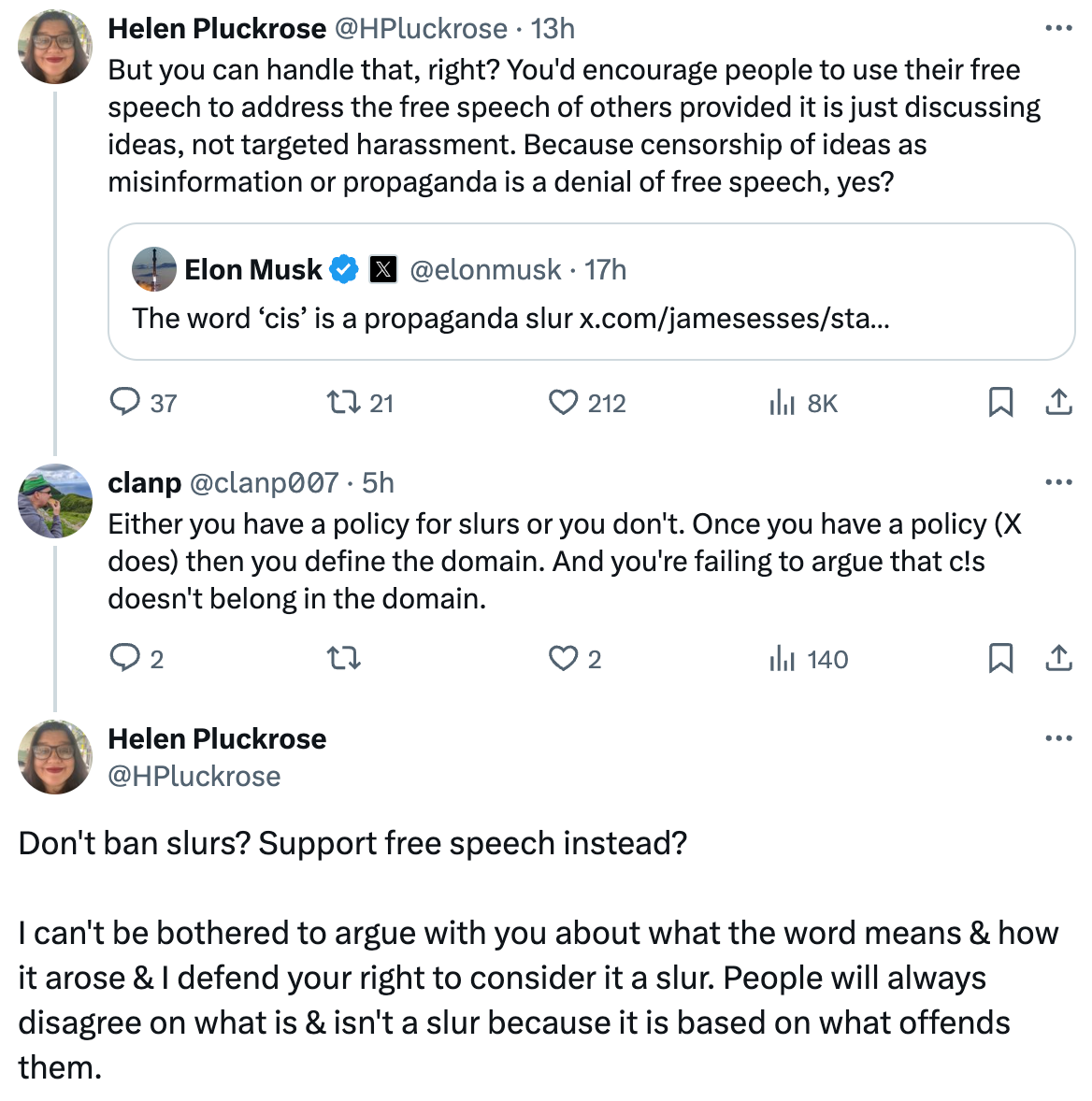
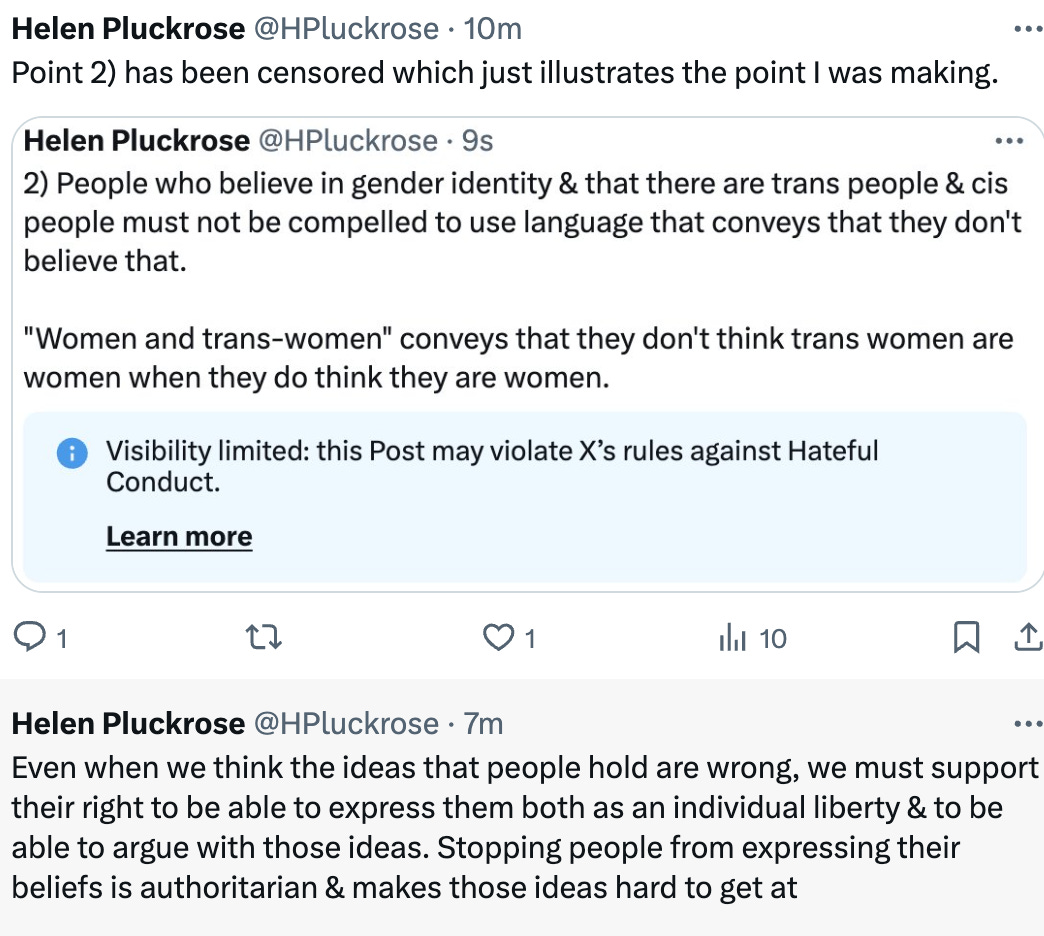
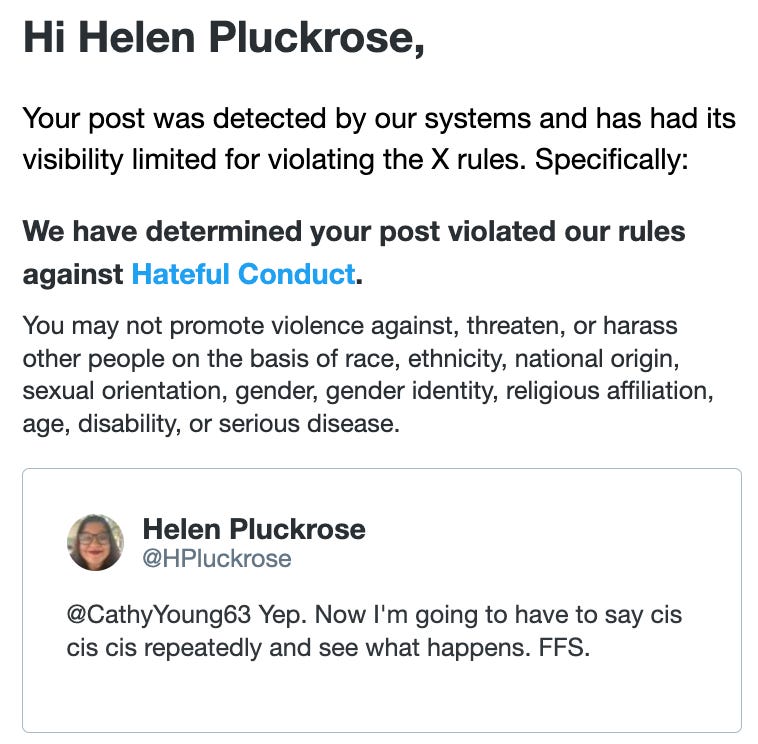
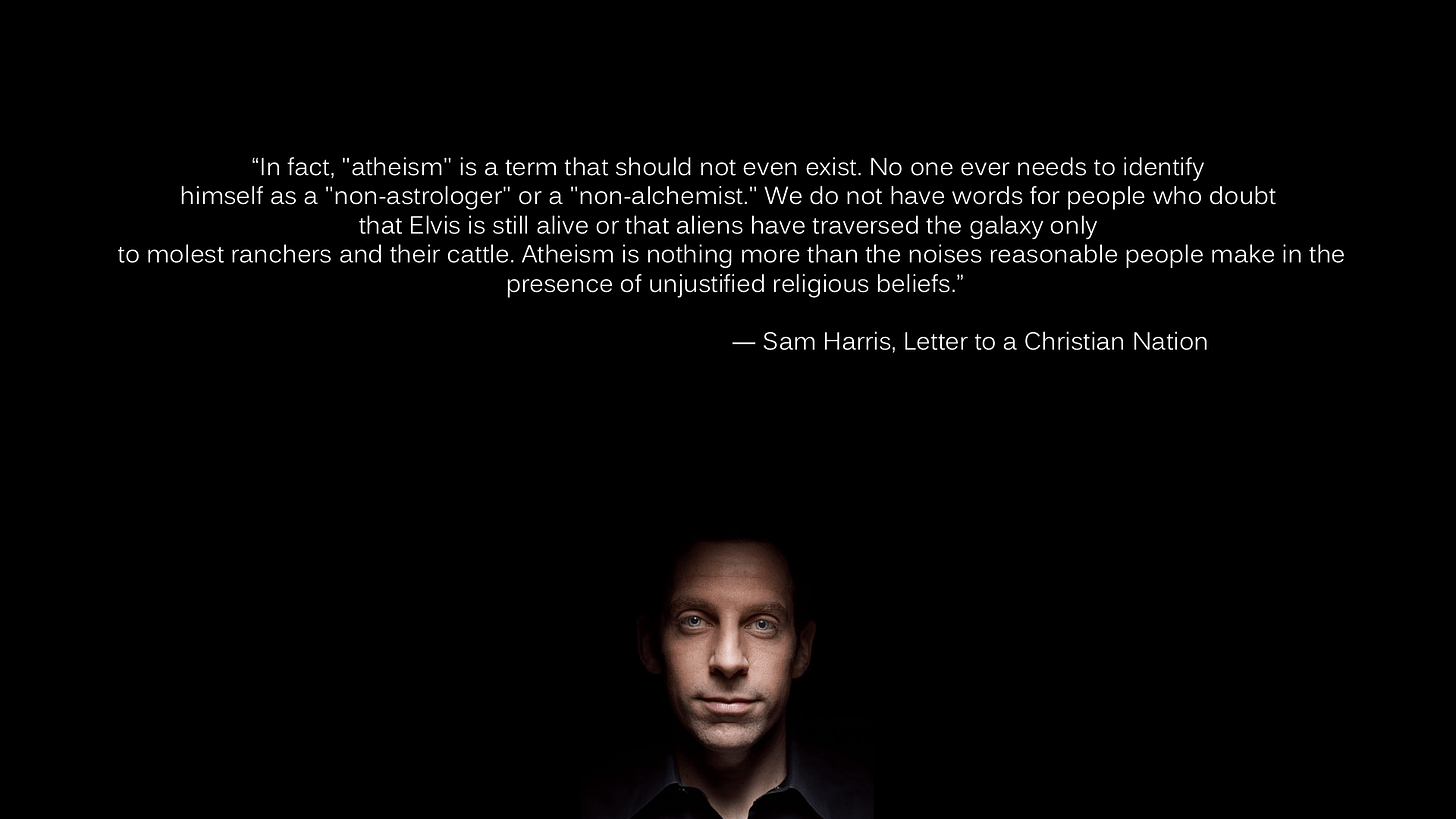
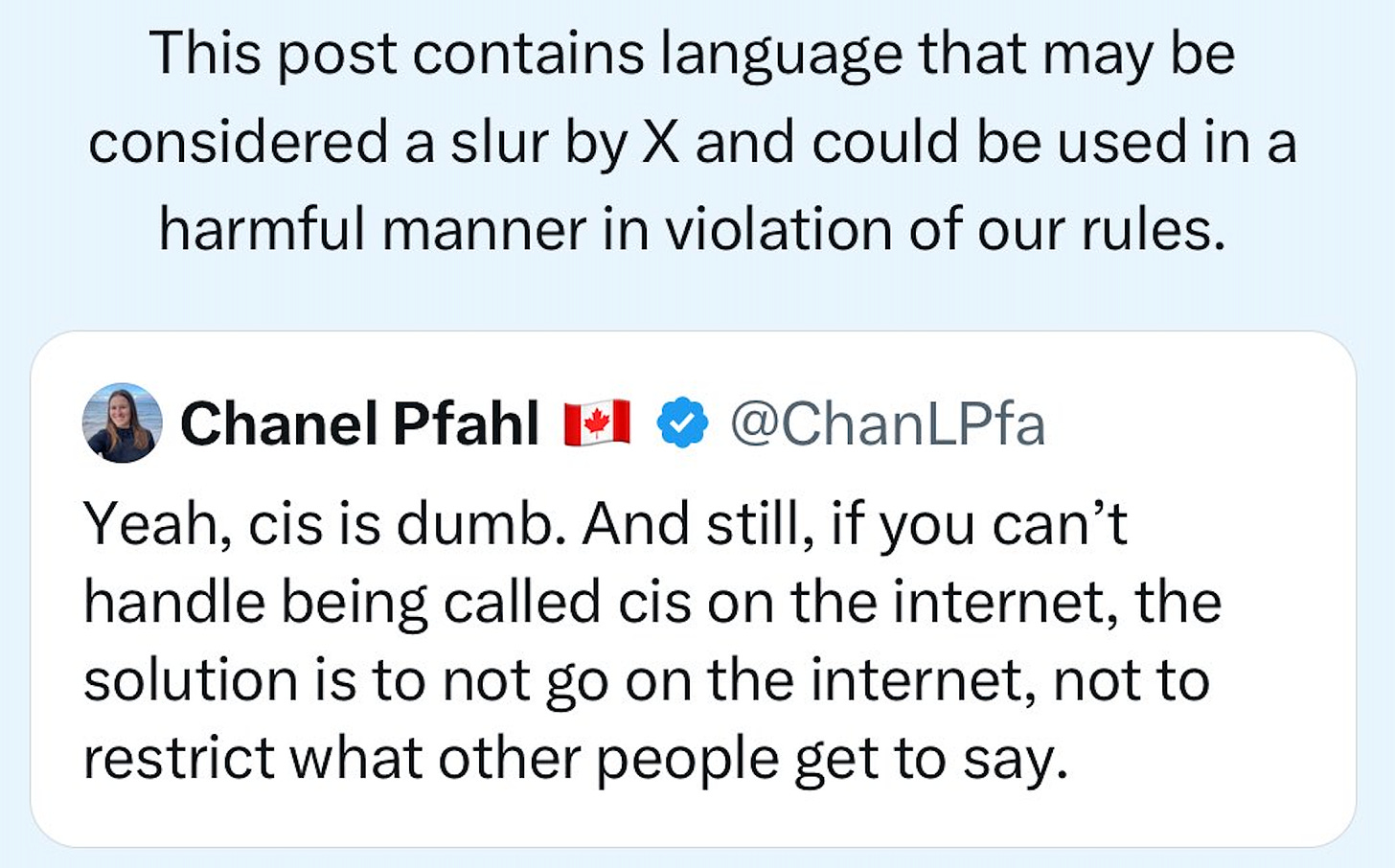
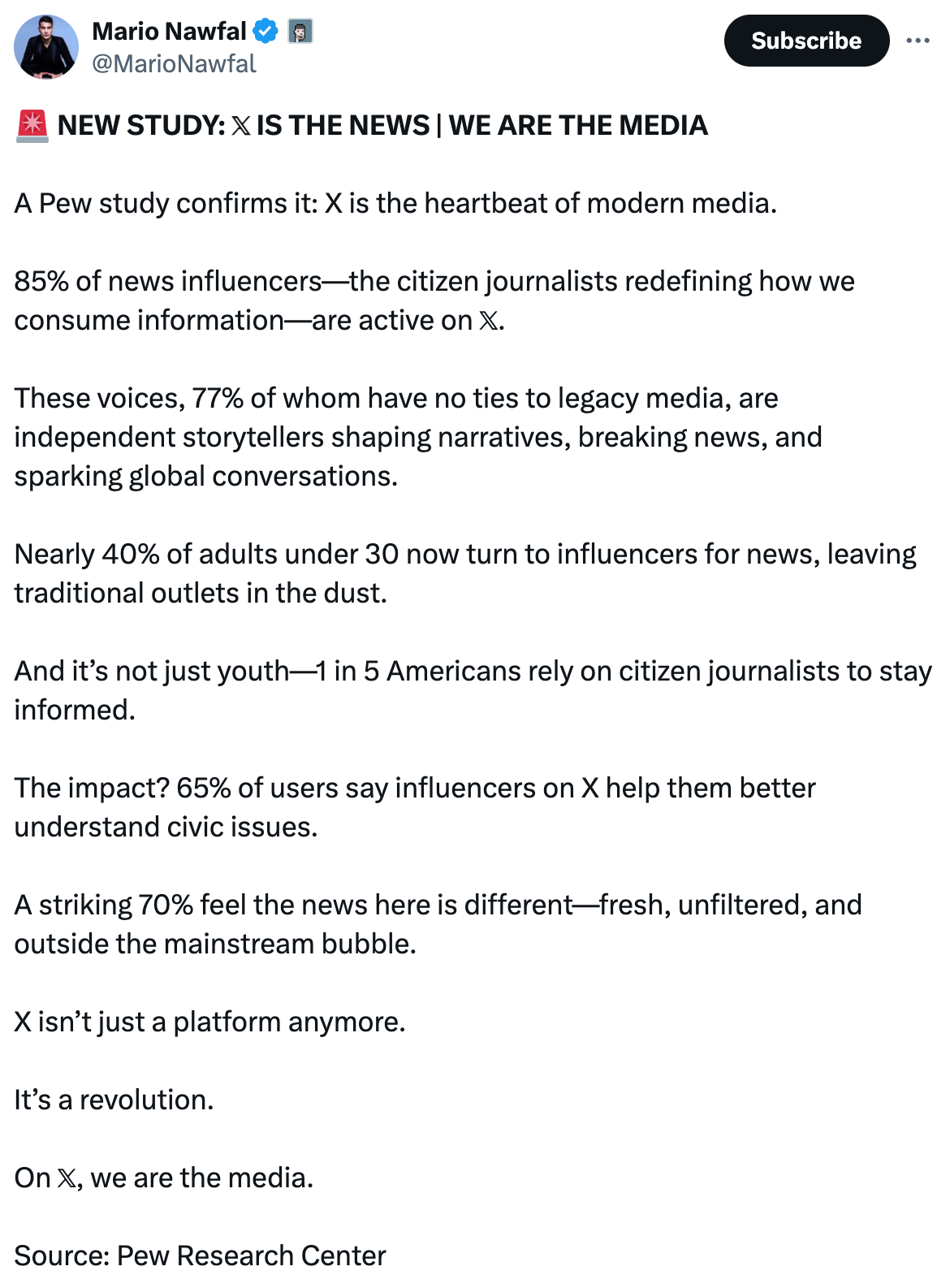
I came across a comment on Threads which asked (probably not in good faith, given the phrasing) why “cis” people felt term didn’t represent their “lived experience.” I pointed out that it’s not that people who dislike it feel it doesn’t represent them; it’s that the term is redundant. For a woman who is “cis”, “woman” encompasses everything you already need to know and all those things are reasonably assumed. The term adds no new information *except* that the person isn’t trans. And there’s no reason to know a person’s trans status unless they are trans.
I argued that this redundancy is actually inherent in the phrase “trans women are women.” “Woman” and “cis woman” are synonymous already. “Trans women are women” is the argument that “trans woman” should also be synonymous with “woman.”
But if it really is the case that trans women are women, then why are such qualifiers required at all? It’s not “cis” women insisting on it; it’s trans women. So, what gives?
I suspect it’s because trans identified people know perfectly well that this qualifier is required for them. It absolutely represents new and vital information about a person that man or woman by itself doesn’t. This feels awkward; it sets them apart from the group they want to be a social part of. So insisting on the use of the qualifier “cis” for everyone else makes it seem like a qualifier is normal and necessary for *everyone* when it isn’t.
This used to be the out loud argument for announcing your pronouns too. If everyone does it, it’s less weird for the people who feel like they *have* to.
But ultimately the ask is too big. It’s one thing to ask me to call you a different name; no big deal. It’s something else entirely to ask me to think about and call *myself* something different just so someone else can manage their own emotions about themselves.
Helen, you always make us think. Thanks for the posting by Chanel, and the one by Sam Harris which shows that giving a name to non-belief is an insidious attempt to tar it with the same brush as having beliefs. It took me only a moment to recognize a similar intent in the word ‘cis’. I agree we shouldn’t ban the word ‘cis’ even though it’s used like a ‘scarlet letter’. But we can refuse to wear it.